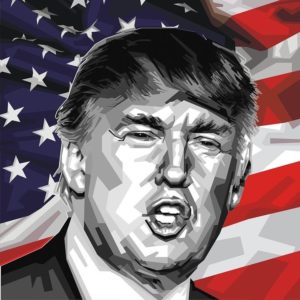
On August 17, 2020, during a campaign rally in Wisconsin, President Donald Trump stated to a crowd of supporters: “We are going to win four more years. And then after that we’ll go for another four years, because they spied on my campaign. We should get a redo of four years.”
On August 18, 2020, the following day at a different campaign rally in Arizona, the President suggested: “Considering we caught President Obama and sleepy Joe Biden spying on our campaign — treason — we’ll probably be entitled to another four more years.”
The “spying” mentioned is in reference to the federal government’s investigation into the 2016 presidential election to determine if there was any Russian collusion. While the President previously indicated that he was joking about seeking a third term, his proclamations about the subject in recent weeks have been more frequent and more serious. Can the President seek a third term? Does federal law provide any exception for additional terms due to interference in presidential campaigns?
At the birth of the nation, there was no laws in place that limited the number of four-year terms that a president may seek. George Washington, the first president, voluntarily decided to not seek a third term of office (likely due to older age and declining health). His successors mostly followed this informal tradition and voluntarily limited themselves to seeking only two terms. Ulysses S. Grant and Theodore Roosevelt seriously considered seeking third terms but were not successful. In 1940, Franklin D. Roosevelt was the first president to be elected to a third term with his success largely attributed to the American public not wishing to change leaders during wartime. For the same reasons, he also won a fourth term in 1944. The president died of a cerebral hemorrhage in 1945 before completing his term and Vice President Harry S. Truman succeeded him. After the Republican Party took control of both the House and the Senate during the 1946 midterm election, they approved a twenty-second constitutional amendment in 1947 that limited presidents to two terms and submitted them to the states. The last state needed for ratification completed the process on February 27, 1951 and the presidential term limit became law.
The Twenty-Second Amendment states as follows:
- “No person shall be elected to the office of the President more than twice, and no person who has held the office of President, or acted as President, for more than two years of a term to which some other person was elected President shall be elected to the office of the President more than once. But this Article shall not apply to any person holding the office of President when this Article was proposed by the Congress, and shall not prevent any person who may be holding the office of President, or acting as President, during the term within which this Article becomes operative from holding the office of President or acting as President during the remainder of such term.”
The two-term limit did not apply to Harry S. Truman, who was the sitting president at the time that the Twenty-Second Amendment was ratified. He served the balance of President Franklin’s fourth term and was elected to a full term in 1948, but chose not to pursue reelection in 1952 due to poor job approval ratings. The Twenty-Second Amendment allows a president to serve a maximum of 10 years. If a vice-president succeeded to the presidency with 2 or more years to go in the predecessor’s term, then he or she could run for only one additional term. If a vice-president succeeded to the presidency with less than 2 years to go in the predecessor’s term, then he or she can run for two full additional terms.
The plain language of the Twenty-Second Amendment provides no mechanism for a “re-do” of a previous term no matter what the circumstances are. Presidents have served through economic recessions, foreign wars and numerous national tragedies. Even in the worst of times, the U.S. Constitution remained in full force and effect. There certainly is no provision in any federal law that permits an exception if there was any kind of spying or espionage in a presidential campaign. Despite President Trump’s optimism about a third term, it simply is not possible under current law.
Can the two-term limitation be eliminated? The Twenty-Second Amendment came to life because the U.S. Constitution was changed, so it can also be repealed through the same process. Article V of the U.S. Constitution provides that an amendment can be proposed either by Congress with a two-thirds majority vote in both houses or by a constitutional convention called by two-thirds of the state legislatures. After a proposed amendment is passed, three-fourth of all state legislatures must ratify it to take effect (today, that would be thirty-eight different states). It is unlikely that this can be accomplished before President Trump is forced to leave office after eight years in power (assuming that he is elected to a second term).
The U.S. Constitution is the supreme law of the land and stands for the proposition that the laws will be fairly enforced no matter how good or bad the current leaders in power are. It is possible that the term limits can be repealed for some future president, but there are simply no exceptions to the rule today. If you have any questions or need legal representation, do not hesitate to contact the experienced attorneys at Kershaw, Vititoe & Jedinak PLC for assistance today.





